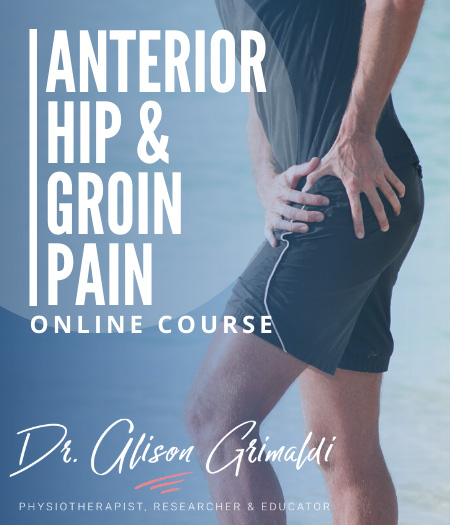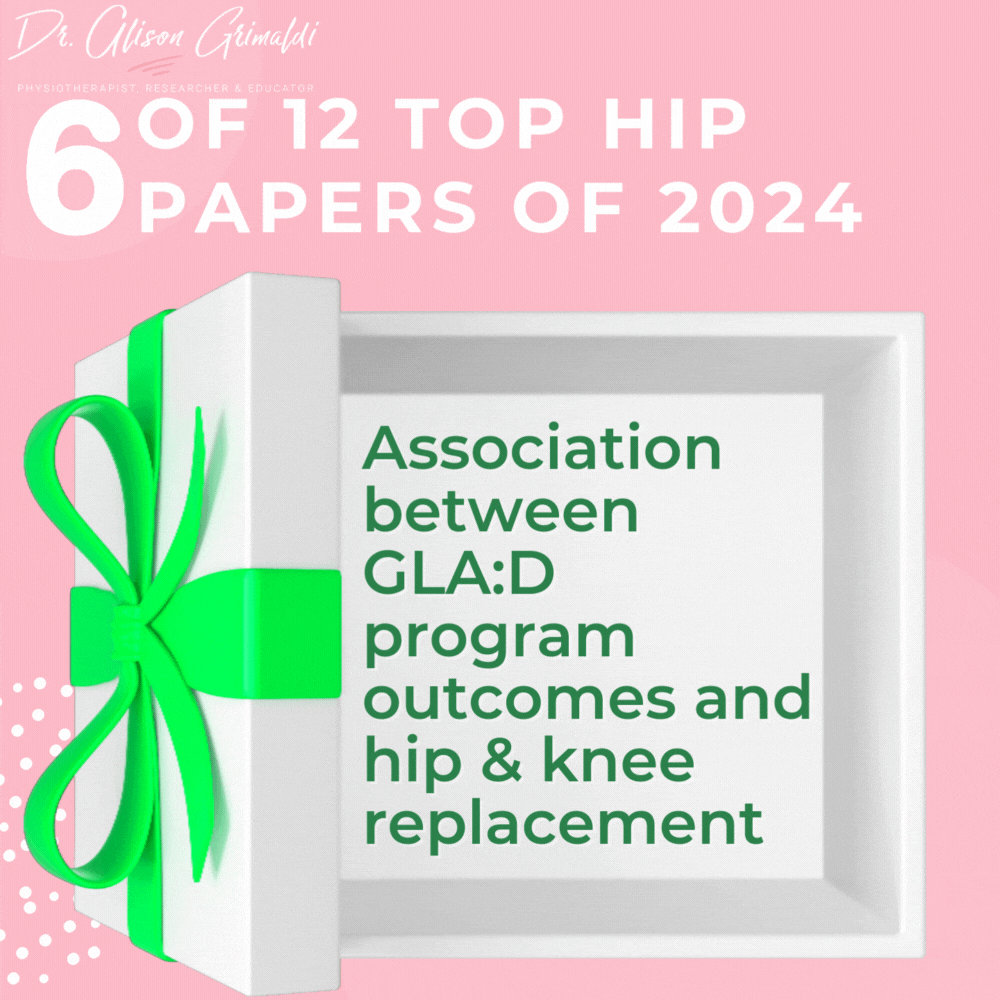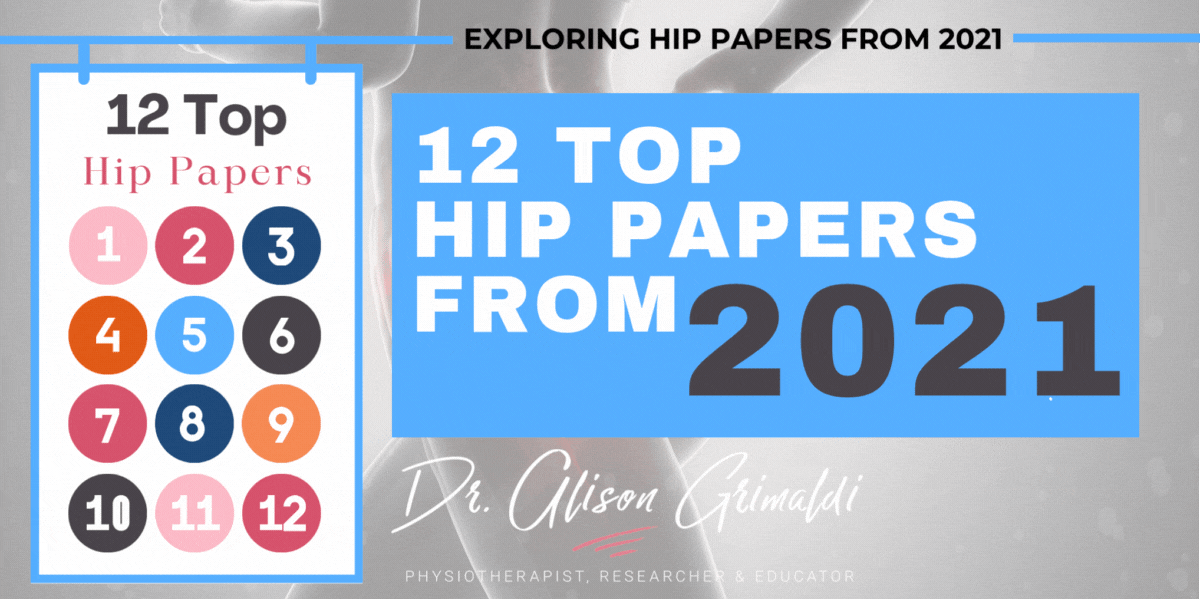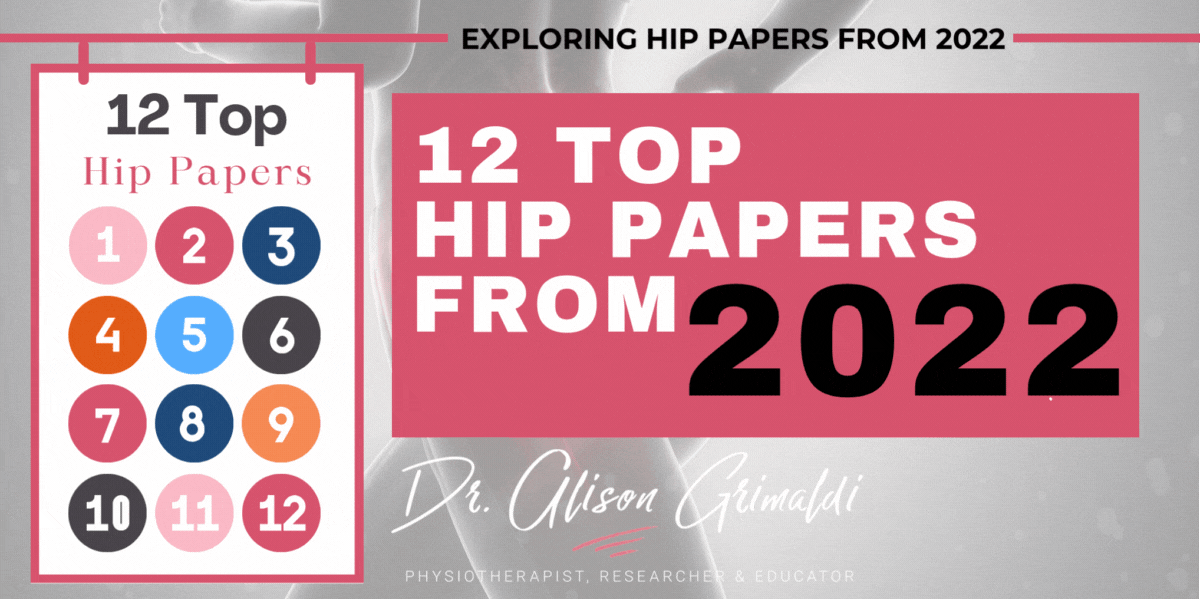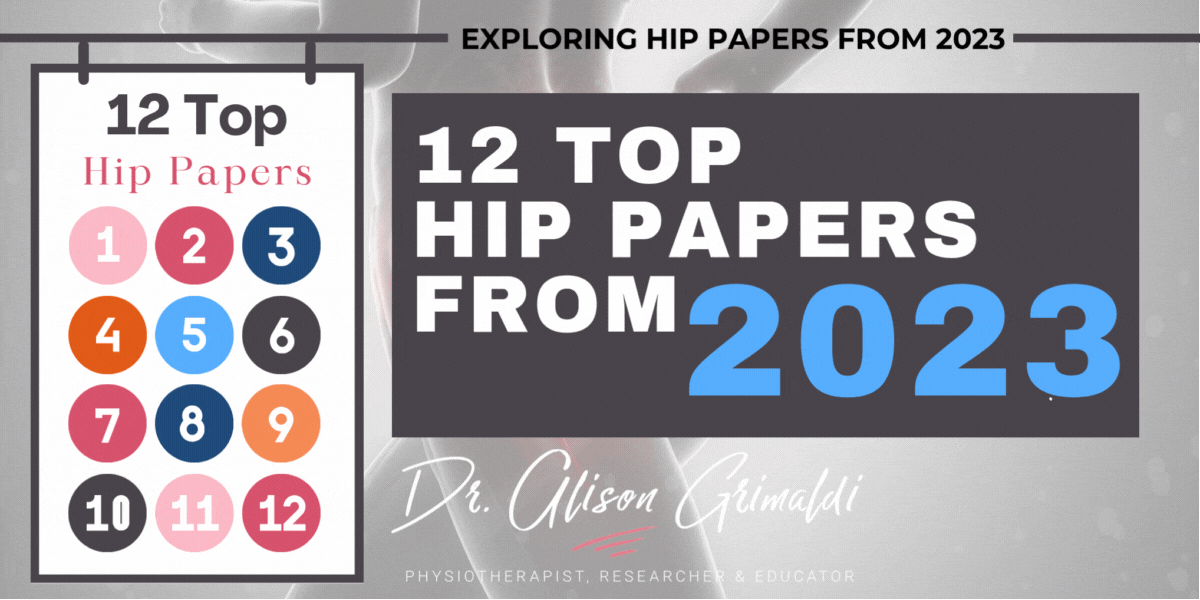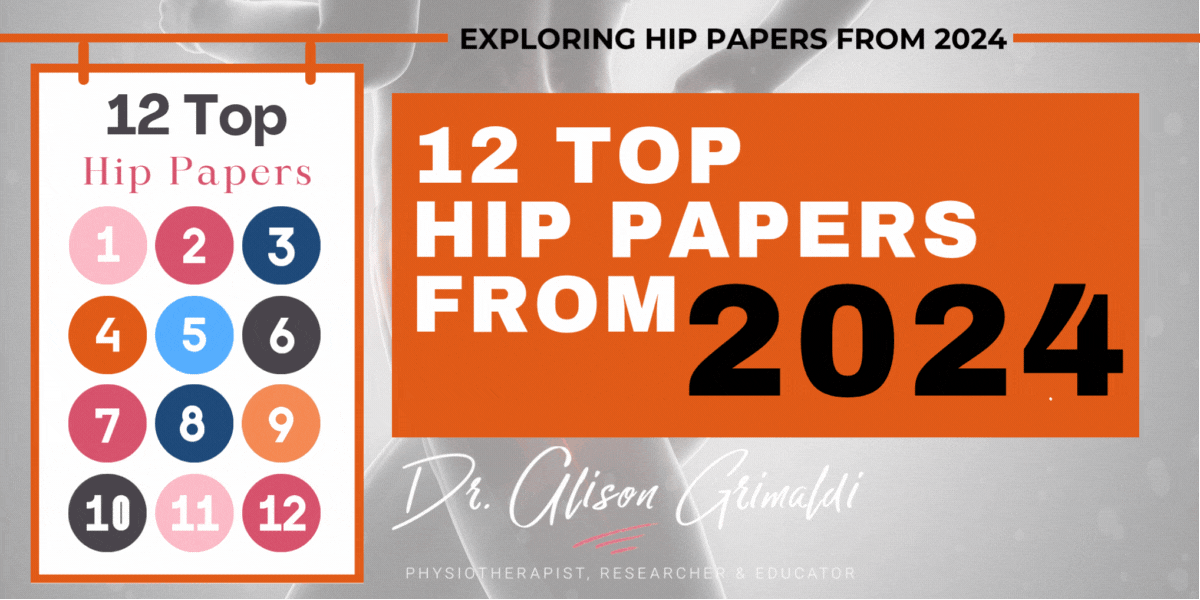7 of 12 Top Hip Papers of 2024 | Will you get what you want from physio-led treatment for FAIS?

Today is Day 7 of my 12 Top 2024 hip papers. If you missed Day 6, you'll find a link at the bottom of this page to take you back. We've covered a heap of great papers with meaningful clinical implications already.
The top hip paper for day 7 asked the question 'Will you get what you want from physio-led treatment for Femoroacetabular Impingement Syndrome?'

7 of 12 Top Hip Papers of 2024: Will you get what you want from physio-led treatment for FAIS?1
Background:
- Those with FAIS usually present with varying degrees of muscle impairment and range restriction, but also describing a wide range of impact on activities of daily living and exercise. FAIS may also impact quality-of-life, mental health and create socioeconomic burden.
- Physiotherapist led interventions often focus on addressing muscle and movement impairments, but what goals and expectations do patients have from treatment?
Study Aims:
- i) To report on the goals and expectations of the study group, and
- ii) To explore associations between expectations and self-reported hip burden and kinesiophobia.
What was done:
- A cross-sectional study, reporting data from 150 participants (35±10 years of age; 49% female) of a clinical trial of physiotherapist–led treatment for femoroacetabular impingement syndrome (FAIS) - the PhysioFIRST trial.
Goal Question:
- Prior to treatment, participants were asked: “Please describe the most important goal you would like to achieve in relation to your hip injury.”
Expectations:
- Expectations were collected on a likert scale and categorised:
- Negative: extremely, very or somewhat unlikely
- Unclear: ‘not sure’ response
- Positive: somewhat, very, or extremely likely.
Tools:
- Self reported burden: iHot-33 questionnaire
- Kinesiophobia: Tampa Scale
- Goals: Qualitative content analysis
- Associations: Linear regression analysis
Prior to the trial interventions for FAIS, participants' treatment goals and expectations of achieving those goals were collected, along with the iHot-33 measure of self-reported burden and kinesiophobia scores. Both intervention arms of the randomised clinical trial were physiotherapist-led, one focusing on targeted strengthening and the other on standardized stretching.
Key Findings:
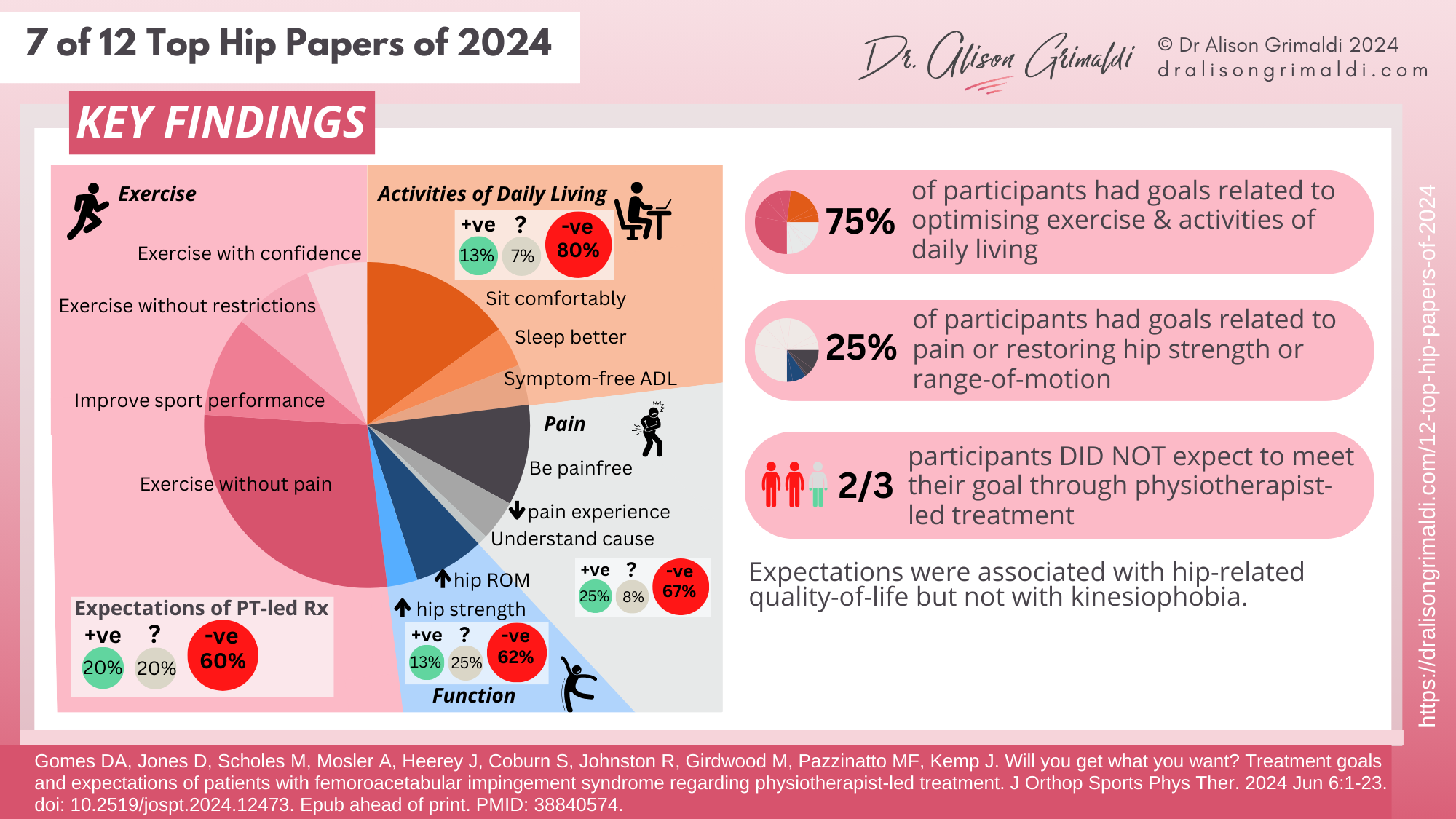
After grouping for common themes, participants' goals related to hip rehabilitation for FAIS fell into 4 main categories – Exercise, Pain, Activity of Daily Living and Physical Function Related goals.
Expectations of physio-led treatment for FAIS, as you can see in the graphic were broadly low, particularly expectations around improving their activities of daily living - 80% had negative expectations in this category!
Only 1 in 4 or less, expected to achieve positive outcomes from the physio intervention for their pain, function (hip ROM or strength) or exercise goals.
Expectations were associated with hip-related quality-of-life but not with kinesiophobia.
Clinical Implications:
- There appears to be a mismatch between goals of patients with FAIS and the primary focus of many physiotherapy interventions - aimed at reducing pain and improving physical function - range-of-motion and strength.
- Treatment goals may be better aligned with patients’ goals, e.g., to exercise, sit and sleep more comfortably.
- Expectations of physio-led treatment for FAIS are overwhelmingly negative, while most patients have positive expectations of surgery.
- Such expectations may be related to patient beliefs around damaged hip structures and abnormal morphology that needs to be ‘fixed.’
- Physiotherapists should establish patient goals, screen for beliefs and discuss expectations of treatments for FAIS
There were a couple of key messages from this paper.
Firstly, the paper highlighted the mismatch between what physios are often focusing on - pain reduction and improving strength or range of motion, and what patients want - a focus on their individual difficulties with activities of daily living and ability to participate in physical activity.
The other key message was that expectations of physio-led treatment for FAIS were overwhelmingly negative, while most patients had positive expectations of surgery. This is likely due to beliefs around damaged hip structures and abnormal morphology that people assume need to be addressed through surgery.
Patients need to be provided with appropriate evidence around what they can expect from surgical interventions. While most people experience benefit in terms of pain and function, the rates of returning to full painfree activities of daily living and sport, and/or full painfree range of motion are relatively low. A good trial of rehabilitation that focuses on patients' individual needs and goals is warranted prior to surgery in most situations.
Like to learn more about assessment and management of FAIS?
In this course, you can find detailed information on pathoaetiology, assessment and management of FAIS and other hip joint, soft tissue and nerve related conditions. To learn more, take the anterior hip and groin pain online course, or join me in an online or practical anterior hip and groin pain workshop.
This online course is included in Hip Academy and Hip Academy members receive discounts for online workshops.
I hope you enjoyed the key learnings from Day 7 of my 12 Top Hip Papers of 2024. There are 5 more papers to come, so don't miss out! Keep following the 12 Hip Days of Christmas for 2024 to see what other top papers and infographics I have prepared for you!

Have you heard about Hip Academy?
Enjoy the benefits of a world class educational Hip Program, specifically designed by Dr Alison Grimaldi to help improve your knowledge surrounding the Hip and Pelvis, and become an expert in your field.
With all Hip Courses included, enjoy all the extra inclusions, including; access to the entire eBook series, growing video library, expanding PDF resource centre, regular member meetings, forums + lots more!

